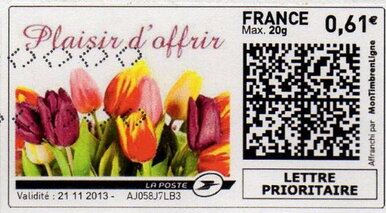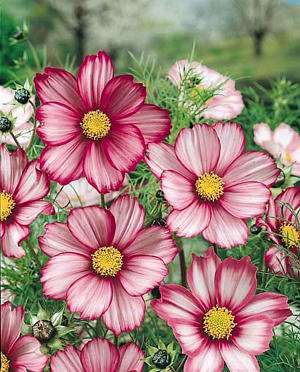Stamp: Pleasure to offer/ Plaisir d'Offrir. Tulips (France 2013)
Pleasure to offer/ Plaisir d'Offrir. Tulips (France 2013)
01 January (France ) within release MontimbrEnLigne. Celebrations goes into circulation Stamp Pleasure to offer/ Plaisir d'Offrir. Tulips face value 0.61 Euro
| Stamp Pleasure to offer/ Plaisir d'Offrir. Tulips in catalogues | |
|---|---|
| Colnect codes: | Col: FR-TIM 2013-150 |
Stamp is square format.
Also in the issue MontimbrEnLigne. Celebrations:
- Stamp - Bonne Fete Maman. Happy Mothers Day face value 0.63;
- Stamp - C'est Paques. Easter Chocolates face value 0.58;
- Stamp - Geburtstag Anniv..... face value 0.61;
- Stamp - Pleasure to offer/ Plaisir d'Offrir. Tulips face value 0.61;
- Stamp - New Year. Bonnes Annee 2013. pink face value 0.97;
- Stamp - Joyous Christmas/Joyeux Noel. Chritsmas tree and presents face value 0.58;
- Stamp - Inauguration face value 0.61;
- Stamp - Pleasure to offer/ Plaisir d'Offrir. Tulips in black face value 0.99;
- Stamp - Santa in a Snow Globe face value 0.55;
- Stamp - Joyful Christmas. Red Baubles. Joyeux Noel face value 0.60;
- Stamp - New Year. Bonne Annee 2013. blue face value 0.58;
- Stamp - Haapy Easter / Joyeuse Paques face value 0.63;
- Stamp - New Year. Bonne Annee 2013. black face value 0.58;
|
Data entry completed
46%
|
|
|---|---|
| Stamp Pleasure to offer/ Plaisir d'Offrir. Tulips in digits | |
| Country: | France |
| Date: | 2013-01-01 |
| Emission: | Personalized - Official |
| Format: | Stamp |
| Face Value: | 0.61 Euro |
Stamp Pleasure to offer/ Plaisir d'Offrir. Tulips it reflects the thematic directions:
A flower, sometimes known as a bloom or blossom, is the reproductive structure found in plants that are floral (plants of the division Magnoliophyta, also called angiosperms). The biological function of a flower is to effect reproduction, usually by providing a mechanism for the union of sperm with eggs. Flowers may facilitate outcrossing (fusion of sperm and eggs from different individuals in a population) or allow selfing (fusion of sperm and egg from the same flower). Some flowers produce diaspores without fertilization (parthenocarpy). Flowers contain sporangia and are the site where gametophytes develop. Many flowers have evolved to be attractive to animals, so as to cause them to be vectors for the transfer of pollen. After fertilization, the ovary of the flower develops into fruit containing seeds. In addition to facilitating the reproduction of flowering plants, flowers have long been admired and used by humans to beautify their environment, and also as objects of romance, ritual, religion, medicine and as a source of food.
A gift or a present is an item given to someone, without the expectation of payment or anything in return. An item is not a gift if that item is already owned by the one to whom it is given. Although gift-giving might involve an expectation of reciprocity, a gift is meant to be free. In many countries, the act of mutually exchanging money, goods, etc. may sustain social relationship and contribute to social cohesion. Economists have elaborated the economics of gift-giving into the notion of a gift economy. By extension, the term gift can refer to any item or act of service that makes the other happier or less sad, especially as a favour, including forgiveness and kindness. Gifts are often presented on occasions such as birthdays and holidays.
Tulips are spring-blooming perennial herbaceous bulbiferous geophytes in the Tulipa genus. Their flowers are usually large, showy, and brightly coloured, generally red, orange, pink, yellow, or white. They often have a different coloured blotch at the base of the tepals, internally. Because of a degree of variability within the populations and a long history of cultivation, classification has been complex and controversial. The tulip is a member of the lily family, Liliaceae,along with 14 other genera, where it is most closely related to Amana, Erythronium, and Gagea in the tribe Lilieae.



